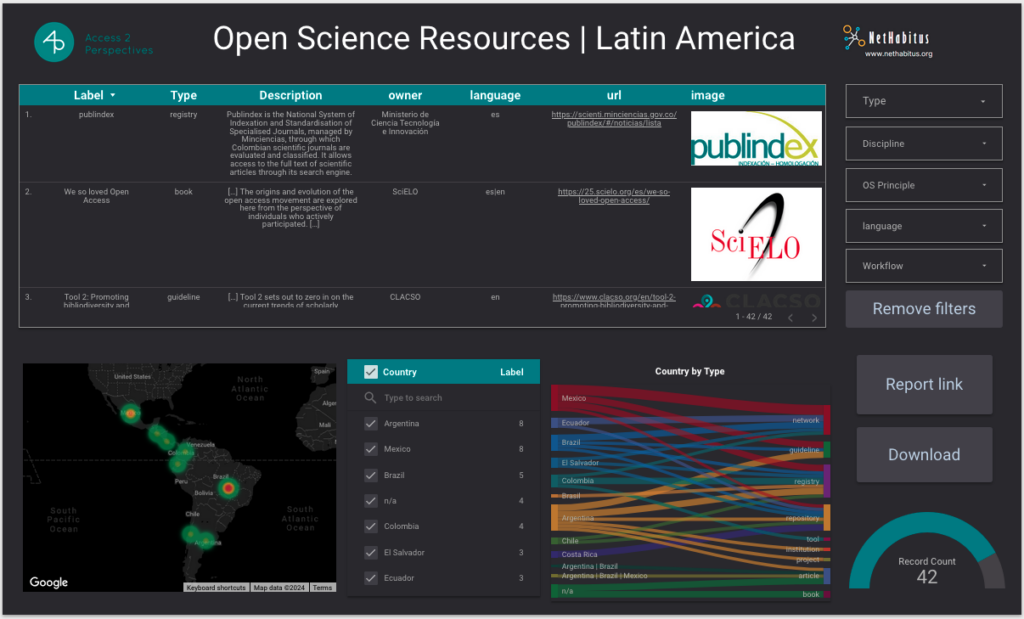An interactive map to visualize more than 1,000 Open Science resources (tools, repositories, communities, guidelines, etc.) from around the world and for a globally inclusive research community.
Sort this map by research disciplines, by Open Science principles, by language, by country and by world region.
- LICENSE: CC-BY SA 4.0
- preprint DOI: 10.21428/51e64700.893d7337
- dataset DOI: 10.5281/zenodo.7554848
Sort this map (see drop-down menu above)
It is possible to switch the view of the map from discipline-focused to sort by Open Science principles, language, region, or country. A user can thus explore which resources are available in a particular language, learn about national Open Science policies, or discover regionally available data repositories.
Vision
- The interactive map can be widely adopted by institutions around the world for quick and easy access to Open Science resources of any kind.
- The map is owned by the community with all contributors listed by name (CRedIT taxonomy) and institutions who commit to making it available as a resource to their staff and visitors.
- For sustainability purposes, revenue streams are offered on top of providing the dataset and key features free of charge to the global scientific community.

Regional view for Latin America, with Open Science resources generated by scholarly stakeholders in the region.
Project description
This map contains resources per discipline across all the open science principles, including:
- Articles, commentaries, blog posts etc. highlighting established or emerging Open Science practices per discipline and research field.
- Open Access resources, including links to DOAJ and The Lens.org journal searches by discipline, discipline-specific preprint repositories, and Open Access declarations.
- Open Data including discipline-specific data repositories, The FAIR and CARE principles.
- Open Hardware communities, networks, and guidelines.
- Open Source Software packages that serve specific disciplines or research fields as well as tools and references.
- Resources and guidelines on Open Evaluation and Assessment, such as SF DORA and CoARA.
- Open Peer Review platforms and communities.
- Open Science policies and guidelines of Selected research associations, funders and other scholarly stakeholders.
- Citizen Science projects and platforms.
- Persistent identifiers relevant for publishing of manuscripts, data and code.
- References to other knowledge systems (indigenous knowledge, researchers at risk, marginalized scholars).
- Multilingual resources and those that are available in languages other than English.
Project details
- Project description // preprint DOI: 10.21428/51e64700.893d7337
- Dataset DOI: 10.5281/zenodo.7554848 // live sheet: Open Science resources by Discipline
- Interactive map: Open Science • Workflow / by OS principle • Kumu
- LICENSE: CC-BY SA 4.0 (to ensure any reuse of the text and data will remain in the publicly accessible domain)
- Submission form: https://forms.gle/rAG7Pu56Z8Dt9fpn8
Current Resource
Currently holding 791resources, including (categories)
- Article
- Guideline
- Book
- Capacity building
- Course
- Event
- Network
- Journal/s
- OER
- Persistent Identfier
- Podcast
- Policy
- Registry
- Repository (100)
- Scholarly search engine (indexing platform)
- Software
- Tool
- [ ] untagged
Sorted by:
- 77 disciplines and subdisciplines
- 58 languages
- 39 organisations / resource owners / stakeholders
- 30 countries and world regions (those that have resources listed)
Related work
- Innovations in Scholarly Communication
- Open Scholarship Grassroots Community Networks
- Bezuidenhout L and Havemann J. The varying openness of digital open science tools [version 2; peer review: 1 approved, 1 approved with reservations]. F1000Research 2021, 9:1292 (https://doi.org/10.12688/f1000research.26615.2)
Next steps
- Reviewing currently listed resources for their relevance versus redundancy
- Adding missing resources, with emphasis on languages other than English and from world regions outside the UK and USA
- Organizing webinars on Open Science resources and community building
- potential academic output
- New manuscript/s with reference to the original description (DOI: 10.21428/51e64700.893d7337)
- Expanded and repurposed interactive map
- By country, type, discipline, … to be published in respectively specific journals as Commentary
- Versioned dataset/s building upon or referencing DOI: 10.5281/zenodo.7554848
- Booklet/s (OER) on usecases and short lists of curated OS resources by country, type, discipline, community, …)
- New manuscript/s with reference to the original description (DOI: 10.21428/51e64700.893d7337)
How to contribute
- Directly to the spreadsheet onto the sheet called “new entries (ignore)” >> Open Science resources by Discipline
- A google form is available for single additions, not feasible to add multiple resources at a time >> https://forms.gle/rAG7Pu56Z8Dt9fpn8
- Ideas, suggestions, feedback here below or as comments
Authorship/contributorship: is given online using CRediT. Everyone who contributes will be credited for the work
This applies both to the project description, as well as the dataset and any other publishable output
